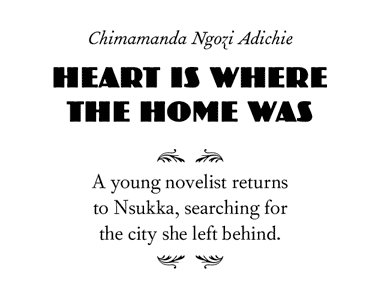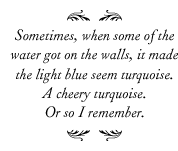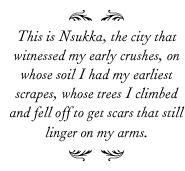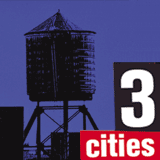
The roads are full of potholes and the car swerves from side to side, moving me along with it, dancing. The dust coats the car windshield, floats in through the open window to coat my skin and my eyelashes; the dust is a coppery red, the color of rust. In front of ramshackle sheds, women fan corn cobs over smoky roasting basins. Signboards slide past, cluttering the roadside, most of them are once-white, now tan with dust and wind: Bebs Photos, Ekwulu Supermarket, Mama Joe Hair Plaiting, Melody Battery, Sysnet Computers, Okoyeuzu Petrol.
"A quaint university town in eastern Nigeria," is how I described Nsukka for my American friends. But itÕs a description that does nothing to capture the potholes, the people I canÕt wait to see, the market that spreads its zinc sheds across the road, the fragrant dust, the fat mosquitoes. I am back after five years. I am re-seeing Nsukka with my Americanized eyes. And I am remembering.

Before 1960, Nsukka was a parochial mass of grass-covered hills dotted with huts and small farms. Then the University was built. People like my father took teaching positions, and by the 1980s when I was growing up, Nsukka was manicured, avenues lined by dogonyaro trees snaked between four-room bungalows with porcelain bathtubs and five-room duplexes with gravel-covered driveways.
We moved from a bungalow to a duplex on Marguerite Cartwright Avenue when my father was made Deputy Vice Chancellor. Our neighbors were colorful, literally. There was the childless Ghanaian woman married to the German professor opposite us. I remember looking out the window and watching them walk around their yard, holding hands, stopping often to kiss. Up our street was the Irish woman married to the Nigerian and their brood of eight loud olive-skinned, devastatingly handsome boys. Then there were the Ijeres nearer us Ð close friends still Ð whose mother was Swiss and who often came over to our house still chewing on their chicken bones from lunch. Other friends would come too, and we would play raucously outside until someone got hurt and an adult made everyone go home, or until the sun went down and it got too dark to see.
Our yard was so alive: the shrieks of children playing football in the lawn with sticks as our goalposts, the buzz of the bees around the cashew tree that sometimes housed spongy hives, the flapping of butterflies around the hibiscus and ixora plants that lined the driveway, the laughter of my parentsÕ guests in the living room, the clucking of the chickens that sauntered around.
Nsukka too was alive. Aneke the butcher had a thriving business and brought us meat in his pick-up truck every Saturday. Mama Joe, who plaited my hair, had a big zinc-covered shed in the market with wood shelves where she placed the covered baskets full of the live snails she sold. Our gardener Jomo (we called him Kenyatta) was robust, had a gleaming bicycle, watered the plants twice a day with a hose and sang as he worked. Sometimes, when some of the water got on the walls, it made the light blue seem turquoise. A cheery turquoise. Or so I remember.

Now it is 2002 and Nsukka is fading. The houses on my street are fading. The rains have whitewashed the light blues and light pinks, window nettings are torn, louvers are missing, hedges have gaping holes. The shabbiness is defiant: There is no attempt to distract the eyes, to plant bright hibiscuses to draw the eyes away from the moldy walls or away from the soil-covered lines that the termites have drawn. And so rust-colored lines zigzag over the houses on my street, without any sense of direction, as though seeking to understand what has occurred here.
Our neighbors are mostly all gone now. Some have passed on. Many, like my father, have retired. Others have left Nigeria and gone abroad. Even though I keep in touch with a few Nsukka families in America,  it strikes me now how rarely we ever talk about the city. We graze over some memories, especially my good friend Ada and I, and talk about missing the good years. But we never land concretely to talk about what Nsukka has become. We choose not to. AdaÕs father, who now teaches at an American university, used to conduct seminars in Nsukka for us children. We got Fanta, chinchin and biscuits and afterwards ticked little boxes on questionnaires that we didnÕt entirely understand. There are very few seminars now because the University cannot afford them. The University cannot afford either to fix broken pipes in the homes of lecturers, or to re-paint houses. Sometimes the lecturers are not paid for months because the federal government does not release the funds. it strikes me now how rarely we ever talk about the city. We graze over some memories, especially my good friend Ada and I, and talk about missing the good years. But we never land concretely to talk about what Nsukka has become. We choose not to. AdaÕs father, who now teaches at an American university, used to conduct seminars in Nsukka for us children. We got Fanta, chinchin and biscuits and afterwards ticked little boxes on questionnaires that we didnÕt entirely understand. There are very few seminars now because the University cannot afford them. The University cannot afford either to fix broken pipes in the homes of lecturers, or to re-paint houses. Sometimes the lecturers are not paid for months because the federal government does not release the funds.

I am filled with an eager longing; I am determined to see everyone and everything. But there are less decisive feelings as well. When I refuse to drive because of the potholes and the way the okada, the motorcycles, are so many and come so close you imagine the exhaust heat will consume the car, I feel something close to shame. I feel an awkward guilt too, when I meet some of the neighborhood children of the lecturers, all younger than I, because my age mates are gone to Lagos and Abuja to seek brighter lights, jobs and marriages. They wear tight jeans and t-shirts with Sean Jean and Phat Farm inscriptions. They want to go to America by all means and avoid speaking Igbo as though they are ashamed of it. They look at me with accusation and admiration: I have been to America. I look at them, drinking Star beer, Guinness malt and Coke, and I feel far removed from them, yet still close. We have Nsukka in common, because we will have childhood memories painted in the same colors.
But most of all, I look at the young boys in awe, in bewildered, fearful awe. They have joined cults. Cults are the latest craze in Nsukka. They are the reasons why mothers want their children back at eight pm, why there is a curfew on campus, why there is fear in the streets. Cults are the reasons young boys shoot each other, young boys who grew up together and played football together in primary school. The second week I am home, the worst incident in the history of the University happens. Eight boys are murdered, by four masked young boys who drive in and start to shoot, gangster-style. From the study where my fatherÕs dusty books line the shelves, I hear the bang-bang-bang of the guns.
They are imitating American movies. And I cannot understand. I cannot understand because I knew of gangs in the Philadelphia neighborhood where I lived and went to school. But I do not understand gangs entrenched in a university system, gangs given the label of "cults," gangs which were so dominant in the university they became almost legitimized. Even though I try, I cannot remember a murder in Nsukka, in the Nsukka of my childhood.

My old girlfriends come to visit. Some of them drive hours to Nsukka; five years is a long time. The constant topic is marriage and they all talk about it with what strikes me as a hollow glee. One of them is marrying a man she has known only four months. She talks about him for an hour, and afterwards I know about his Mercedes and his house in Lagos and his trips abroad, but I donÕt know anything about him. She is so happy she is leaving Nsukka for good, since there is nothing in Nsukka after all. I feel sad, an emotion as unreasonable and strong as my guilt, because I wonder if she realizes that her decision is purely about money. But then I wonder if I have the right to feel sad, if it is my place to feel sad.
I should understand: itÕs not just Nsukka, itÕs Nigeria. I should realize that it is only a reflection of the state of my country. I should accept that these things are expected because of the unemployment, the corruption, the lack of hope. I should accept that the water sometimes doesnÕt run for weeks and people bathe once a day instead of twice and they pay crazy amounts to have a tanker deliver water to their homes. I should accept that Mama Joe, who plaited my hair while I was back, now has a tiny shed in the market and no longer sells snails in the rainy season because she cannot afford to buy them in bulk anymore. I should accept that our new gardener Harrison picks out moldy bread from our garbage can to help feed his thirteen children. I should accept that economies change, that cities change. But this is not just any city: this is Nsukka, the city that witnessed my early crushes, on whose soil I had my earliest scrapes, whose trees I climbed and fell off to get scars that still linger on my arms. This is Nsukka, where I went to church and school and library. This is Nsukka, now.

At the market, many of the traders hug me, rub my cheeks.
"Eh! You look well," they say, "you look fresh."
The younger ones marvel that I have kept my figure in America. The older ones mournfully say that I have not fattened at all after the years in America, despite the fact that everyone gets fat in America because of all the good food there. Many say congratulations for graduating with an American First Class. My mother has told them, she has told almost everyone in town. I bask in the good wishes.
I buy things I do not want and leave the change, sometimes so much change that the traders look embarrassed. I feel as though I am being silly, trying in vain to make up for something, like trying to fill a huge tank by collecting water with a spoon.  I run into Aneke, the butcher. He heard I was back, he tells me, and was planning to visit. I remember a chubby man, a man very much like the meaty cows he slaughtered. I see a drawn man whose khaki trousers hang on him. But the smile is the same, the smile of all those years when he threw in extra liver with my momÕs order because he knew I liked it. He hugs me, congratulates me on graduating with honors. I look at him and I am touched because although his shed is smaller now and fewer people buy meat, and although he no longer has a pick-up truck but a rusty motorcycle, and although he no longer delivers meat to any home, he is smiling genuinely. I wonder if my smile would be that wide, that real, if the roles were reversed, if I were in AnekeÕs shoes. And I feel guilt, a liberal neo-socialist guilt, the same kind of guilt I feel when I look at the battered shoes of our driver and gardener. I wonder if Aneke ever questions the illogical inequality of our two lives. I doubt that he does. I run into Aneke, the butcher. He heard I was back, he tells me, and was planning to visit. I remember a chubby man, a man very much like the meaty cows he slaughtered. I see a drawn man whose khaki trousers hang on him. But the smile is the same, the smile of all those years when he threw in extra liver with my momÕs order because he knew I liked it. He hugs me, congratulates me on graduating with honors. I look at him and I am touched because although his shed is smaller now and fewer people buy meat, and although he no longer has a pick-up truck but a rusty motorcycle, and although he no longer delivers meat to any home, he is smiling genuinely. I wonder if my smile would be that wide, that real, if the roles were reversed, if I were in AnekeÕs shoes. And I feel guilt, a liberal neo-socialist guilt, the same kind of guilt I feel when I look at the battered shoes of our driver and gardener. I wonder if Aneke ever questions the illogical inequality of our two lives. I doubt that he does.

I dream often of the house I will build in Nsukka one day, a charming simple bungalow on the serene hilly area just outside the University campus, with bougainvillea creeping up the windows, a splash of purple across the white house. I see cashew trees bordering the house so that those yellow birds with the bright orange beaks will wake me up in the mornings with their syrupy chirping. I dream of organizing cooperatives, of becoming a well-regarded writer and writing so much about Nsukka that people who care, will invest in it. And yet, as I was driven away, towards the airport, my visit temporarily over, I felt liquid emotions churning inside me. The strongest was a sense of loss. And as the car rocked from side to side, as the driver tried to avoid the potholes, apologizing as though they were his fault, I realized that there were things I would always look for and never find.
Back to Top | Table of Contents | Subscribe to Topic

|

